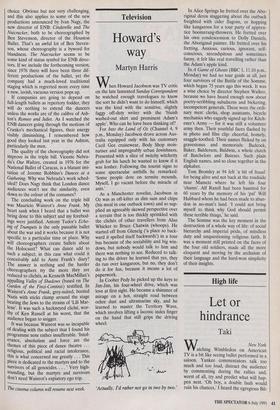Television
Howard's way
Martyn Harris
When Howard Jacobson was TV critic on the late lamented Sunday Correspondent he watched enough travelogues to know the sort he didn't want to do himself, which was the kind with the sensitive, slightly faggy off-duty writer with the 'bluish washed-out shirt and prominent Adam's apple'. Who can he have been thinking of? For Into the Land of Oz (Channel 4, 9 p.m., Monday) Jacobson drove across Aus- tralia equipped only with his customary Cecil Gee cruisewear, Body Shop mois- turiser and impregnably urban Jewishness. Presented with a slice of twitchy witchetty grub for his lunch he wanted to know if it was kosher. Following the tourist signs to some spectacular anthills he remarked: `Some people dote on termite mounds. Myself, I go vacant before the miracle of ants.'
As a Manchester novelist, Jacobson in Oz was as off-kilter as dim sum and chips (his meal in one outback town) and so sup- plied an agreeably skewed perspective over a terrain that is too thickly sprinkled with the clichés of other travellers from Alan Whicker to Bruce Chatwin (whoops). He started off from Glenelg Ca place so back- ward it spelled itself backwards') in a tour bus because of the sociability and big win- dows, but nobody would talk to him and there was nothing to see. Reduced to talk- ing to the driver he learned that yes, they do run over kangaroos, but no, they don't do it for fun, because it means a lot of paperwork. In Coober Pedy he picked up the keys to Jim-Jim, his four-wheel drive, which was love at first sight. He became a shimmer of mirage on a hot, straight road between ochre dust and ultramarine sky, and he learned to master the Territory Wave, which involves lifting a laconic index finger on the hand that still grips the driving wheel.
`Actually, I'd rather not go in two by two.' In Alice Springs he fretted over the Abo- riginal deros staggering about the outback freighted with cider flagons, or hopping like kangaroos for a tour party of appren- tice boomerang-throwers. He fretted over his own condescension to Dolly Daniels, the Aboriginal painter. He fretted over his fretting. Anxious, curious, ignorant, self- conscious, serendipitous and sometimes funny, it felt like real travelling rather than the Adam's apple kind.
In A Game of Ghosts (BBC 1, 11.10 p.m., Monday) we had no tour guide at all, just four survivors of the Battle of the Somme, which began 75 years ago this week. It was a wise choice by director Stephen Walker, because we have heard enough now about poetry-scribbling subalterns and bickering, incompetent generals. These were the ordi- nary men: clerks, shop assistants, bicycle mechanics who eagerly signed up for Kitch- ener's Army — for it was still a volunteer army then. Their youthful faces flashed by in photo and film clip: cheerful, homely, snaggle-toothed. Their names flicked by on gravestones and memorials: Badcock, Baker, Balderson, Baldwin, a whole clutch of Batchelors and Bateses. Such plain English names, and so close together in the alphabet.
Tom Bromley at 94 felt 'a bit of fraud' for being alive and not back at the roadside near Mametz where he left his four `chums'. Alf Razell had been haunted for 60 years by the memory of his 'pal' Will Hubbard whom he had been made to aban- don in no-man's land. 'I could not bring myself to think why God should permit these terrible things,' he said.
The Somme was the key moment in the destruction of a whole way of life: of social hierarchy and imperial pride, of mindless duty and unquestioning religious faith. It was a moment still printed on the faces of the four old soldiers, made all the more eloquent and moving by the archaism of their language and the hard-won simplicity of their insights.


















































 Previous page
Previous page